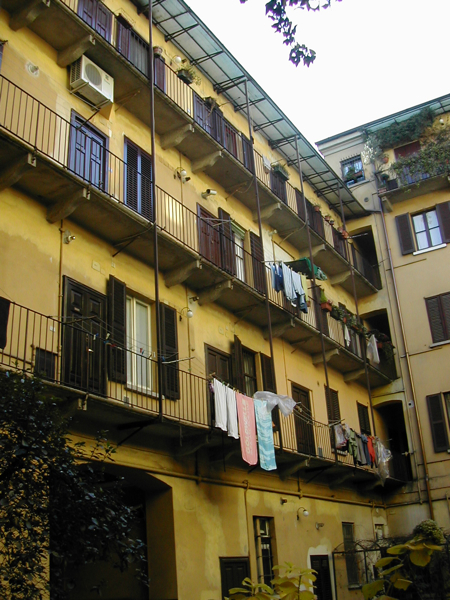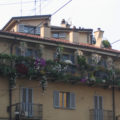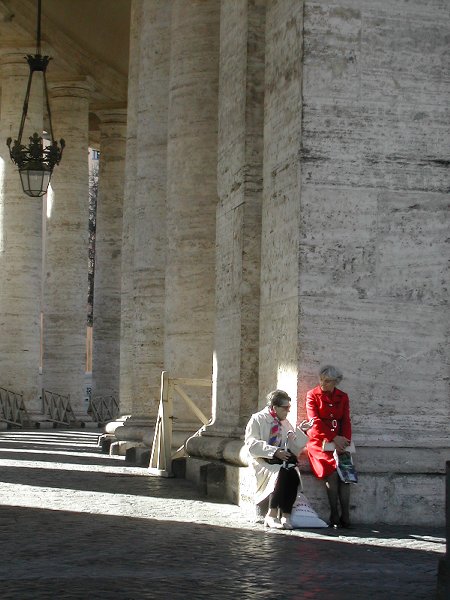During my July trip to the US, I stayed with friends in different cities and types of homes, giving me fodder for reflection on differences in customs, styles, and expectations for housing in the US and Italy.
As I have mentioned before, renting an unfurnished apartment in Italy means completely unfurnished, so for our new home in Lecco we’ve had to put in a kitchen (including the sink) and all the appliances. (A friend here told me that she once looked at a place to rent which didn’t even have toilets!)
Appliances are different here. Refrigerators are smaller. Traditionally, Italian mammas shop for fresh food daily, so don’t need as much storage space for perishables, although the trend nowadays is to less-frequent visits to larger supermarkets, which leads to larger fridges.
In Italy, almost everyone has a (clothes) washing machine in their home, often installed in the kitchen or a bathroom (our second bathroom has a special washer-sized alcove, with pipes). In the US you’ll find shared, coin-operated machines in the basements of some apartment/condo buildings, but I’ve never seen this in Italy. Coin-operated storefront laundromats are a recent phenomenon here, and probably exist only in the big cities.
With an Italian home washing machine, a single load of laundry can take two hours, depending on the water temperature you select, because the washers heat their own water. This makes sense, since many homes have only one small, electric boiler to heat water for the shower and kitchen.
Most Italians don’t have clothes dryers. They are available, but, given the cost of electricity here (twice what Americans pay), a dryer would be very expensive to run. And dryers are bad for natural-fiber clothing – I much prefer line drying. We have a large drying rack out on the balcony which gets sun every afternoon, so things dry quickly. In winter, the trick is to hang wet clothes on or near the radiators, which humidifies the air as well as drying the clothes. In Milan I had mini drying racks designed to hang on the radiators. (In Switzerland, there is a communal drying area in the basement of some buildings. I don’t think Italians trust each other enough for that.)
Plugging in appliances can be a challenge. There are three types of electrical outlets in current use in Italy, plus one weird one that apparently enjoyed only brief popularity (I’ve only seen it in my in-laws’ former apartment in Rome). There are also variants on the two basic plugs, with or without grounding (many older buildings don’t have it, and it’s expensive to add). Aside from the grounding, it’s never been clear to me whether one type of outlet is safer or can carry more load than another. If you’ve got something that has to be plugged in at a particular spot and the plugs don’t match, you either use an adapter or change the plug on the appliance. There are never enough outlets in Italian homes; sometimes entire walls have no outlets, which can play havoc with room arrangements.
There never seems to be enough capacity, either. My in-laws’ Rome apartment was big, but very inadequately wired; you could never have two major appliances on at the same time. At night we always had to think about which bathroom water heater was already heated up and which needed to be turned on in preparation for morning showers; everything else had to be turned off before running the dishwasher, otherwise the fuses would trip and we’d have fumble our way down to the basement in the dark to turn the power back on. Here in Lecco, I’ve discovered, I can’t run the dishwasher and washing machine at the same time (this wasn’t an issue in Milan; our kitchen was too small to hold a dishwasher).
Homes are constructed differently, too. Basic building materials in Italy are concrete, brick, and sometimes stone. In the mountains, some houses are chalet-style, made of thick wooden planks. In the US, most modern houses are wood framed, with wooden or aluminum siding or stucco outside, and sheetrock inside. By European standards, they’re flimsy, and they catch fire easily. Fire trucks screaming down the street are a common sight in the US; in Europe, they’re rare. The few city fires I’ve heard of in Italy were in factories, though we do have a big problem with forest fires in the summer.










